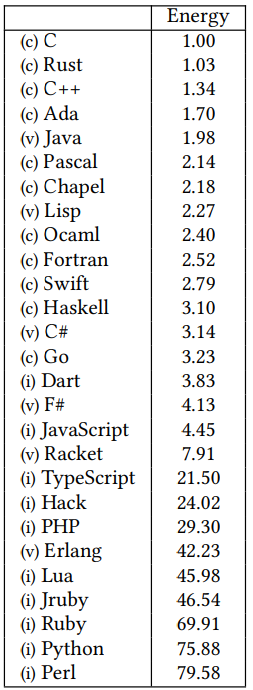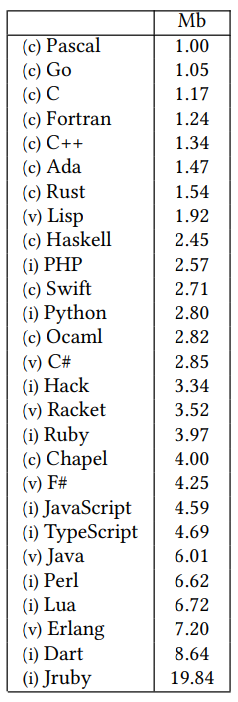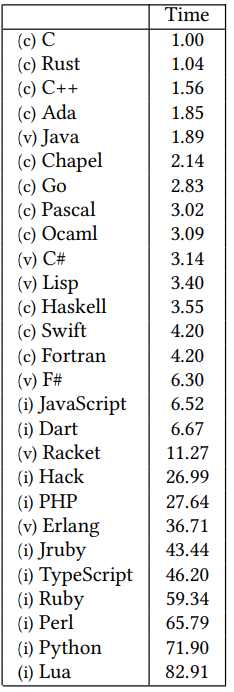What are the Greenest or Least Environmentally Friendly Programming Languages?
Technology has revolutionized the way we live, work, and play. It has also had a profound impact on the world of programming languages. In recent years, there has been a growing trend towards green, energy-efficient languages such as C and C++. C++ and Rust are two of the most popular languages in this category. Both are designed to be more efficient than traditional languages like Java and JavaScript. And both have been shown to be highly effective at reducing greenhouse gas emissions. So if you’re looking for a language that’s good for the environment, these two are definitely worth considering.
The study below runs 10 benchmark problems in 28 languages [1]. It measures the runtime, memory usage, and energy consumption of each language. The abstract of the paper is shown below.
“This paper presents a study of the runtime, memory usage and energy consumption of twenty seven well-known software languages. We monitor the performance of such languages using ten different programming problems, expressed in each of the languages. Our results show interesting findings, such as, slower/faster languages consuming less/more energy, and how memory usage influences energy consumption. We show how to use our results to provide software engineers support to decide which language to use when energy efficiency is a concern”. [2]
According to the “paper,” in this study, they monitored the performance of these languages using different programming problems for which they used different algorithms compiled by the “Computer Language Benchmarks Game” project, dedicated to implementing algorithms in different languages.
The team used Intel’s Running Average Power Limit (RAPL) tool to measure power consumption, which can provide very accurate power consumption estimates.
The research shows that several factors influence energy consumption, as expected. The speed at which they are executed in the energy consumption is usually decisive, but not always the one that runs the fastest is the one that consumes the least energy as other factors enter into the power consumption equation besides speed, as the memory usage.
Energy
From this table, it is worth noting that C, C++and Java are among the languages that consume the least energy. On the other hand, JavaScript consumes almost twice as much as Java and four times what C consumes. As an interpreted language, Python needs more time to execute and is, therefore, one of the least “green” languages, occupying the position of those that consume the most energy.

Time:
The results are similar to the energy expenditure; the faster a programming language is, the less energy it expends.
Memory
In terms of memory consumption, we see how Java has become one of the most memory-consuming languages along with JavaScript.

Ranking
In this ranking, we can see the “greenest” and most efficient languages are: C, C+, Rust, and Java, although this last one shoots the memory usage.
From the Paper: Normalized global results for Energy, Time, and Memory.
To conclude:
Most Environmentally Friendly Languages: C, Rust, and C++
Least Environmentally Friendly Languages: Ruby, Python, Perl
Although this study may seem curious and without much practical application, it may help design better and more efficient programming languages. Also, we can use this new parameter in our equation when choosing a programing language.
This parameter can no longer be ignored in the future or almost the present; besides, the fastest languages are generally also the most environmentally friendly.
If you’re interested in something that is both green and energy efficient, you might want to consider the Groeningen Programming Language (GPL). Developed by a team of researchers at the University of Groningen in the Netherlands, GPL is a relatively new language that is based on the C and C++ programming languages. Python and Rust are also used in its development. GPL is designed to be used for developing energy efficient applications. Its syntax is similar to other popular programming languages, so it should be relatively easy for experienced programmers to learn. And since it’s open source, you can download and use it for free. So why not give GPL a try? It just might be the perfect language for your next project.
Top 10 Caveats – Counter arguments:
#1 C++ will perform better than Python to solve some simple algorithmic problems. C++ is a fairly bare-bone language with a medium level of abstraction, while Python is a high-level languages that relies on many external components, some of which have actually been written in C++. And of course C++ will be efficient than C# to solve some basic problem. But let’s see what happens if you build a complete web application back-end in C++.
Advertise with us - Post Your Good Content Here
We are ranked in the Top 20 on Google
AI Dashboard is available on the Web, Apple, Google, and Microsoft, PRO version
#2: This isn’t much useful. I can imagine that the fastest (performance-wise) programming languages are greenest, and vice versa. However, running time is not only the factor here. An engineer may spend 5 minutes writing a Python script that does the job pretty well, and spends hours on debugging C++ code that does the same thing. And the performance difference on the final code may not differ much!
#3: Has anyone actually taken a look at the winning C and Rust solutions? Most of them are hand-written assembly code masked as SSE intrinsic. That is the kind of code that only a handful of people are able to maintain, not to mention come up with. On the other hand, the Python solutions are pure Python code without a trace of accelerated (read: written in Fortran, C, C++, and/or Rust) libraries like NumPy used in all sane Python projects.
#4: I used C++ years ago and now use Python, for saving energy consumption, I turn off my laptop when I got off work, I don’t use extra monitors, my AC is always set to 28 Celsius degree, I plan to change my car to electrical one, and I use Python.
#5: I disagree. We should consider the energy saved by the products created in those languages. For example, a C# – based Microsoft Teams allows people to work remotely. How much CO2 do we save that way? 😉
Now, try to do the same in C.
#6 Also, some Python programs, such as anything using NumPy, spend a considerable fraction of their cycles outside the Python interpreter in a C or C++ library..
I would love to see a scatterplot of execution time vs. energy usage as well. Given that modern CPUs can turbo and then go to a low-power state, a modest increase of energy usage during execution can pay dividends in letting the processor go to sleep quicker.
An application that vectorized heavily may end up having very high peak power and moderately higher energy usage that’s repaid by going to sleep much sooner. In the cell phone application processor business, we called that “race to sleep.” By Joe Zbiciak
#7 By Tim Mensch : It’s almost complete garbage.
If you look at the TypeScript numbers, they are more than 5x worse than JavaScript.
This has to mean they were running the TypeScript compiler every time they ran their benchmark. That’s not how TypeScript works. TypeScript should be identical to JavaScript. It is JavaScript once it’s running, after all.
Given that glaring mistake, the rest of their numbers are suspect.
I suspect Python and Ruby really are pretty bad given better written benchmarks I’ve seen, but given their testing issues, not as bad as they imply. Python at least has a “compile” phase as well, so if they were running a benchmark repeatedly, they were measuring the startup energy usage along with the actual energy usage, which may have swamped the benchmark itself.
PHP similarly has a compile step, but PHP may actually run that compile step every time a script is run. So of all of the benchmarks, it might be the closest.
I do wonder if they also compiled the C and C++ code as part of the benchmarks as well. C++ should be as optimized or more so than C, and as such should use the same or less power, unless you’re counting the compile phase. And if they’re also measuring the compile phase, then they are being intentionally deceptive. Or stupid. But I’ll go with deceptive to be polite. (You usually compile a program in C or C++ once and then you can run it millions or billions of times—or more. The energy cost of compiling is miniscule compared to the run time cost of almost any program.)
I’ve read that 80% of all studies are garbage. This is one of those garbage studies.
#8 By Chaim Solomon: This is nonsense
This is nonsense as it runs low-level benchmarks that benchmark basic algorithms in high-level languages. You don’t do that for anything more than theoretical work.
Do a comparison of real-world tasks and you should find less of a spread.
Do a comparison of web-server work or something like that – I guess you may find a factor of maybe 5 or 10 – if it’s done right.
Don’t do low-level algorithms in a high-level language for anything more than teaching. If you need such an algorithm – the way to do it is to implement it in a library as a native module. And then it’s compiled to machine code and runs as fast as any other implementation.
#9 By Tim Mensch
It’s worse than nonsense. TypeScript complies directly to JavaScript, but gets a crazy worse rating somehow?!
#10 By Tim Mensch
For NumPy and machine learning applications, most of the calculations are going to be in C.
The world I’ve found myself in is server code, though. Servers that run 24/7/365.
And in that case, a server written in C or C++ will be able to saturate its network interface at a much lower continuous CPU load than a Python or Ruby server can. So in that respect, the latter languages’ performance issues really do make a difference in ongoing energy usage.
But as you point out, in mobile there could be an even greater difference due to the CPU being put to sleep or into a low power mode if it finishes its work more quickly.
Active Hydrating Toner, Anti-Aging Replenishing Advanced Face Moisturizer, with Vitamins A, C, E & Natural Botanicals to Promote Skin Balance & Collagen Production, 6.7 Fl Oz


Age Defying 0.3% Retinol Serum, Anti-Aging Dark Spot Remover for Face, Fine Lines & Wrinkle Pore Minimizer, with Vitamin E & Natural Botanicals


Firming Moisturizer, Advanced Hydrating Facial Replenishing Cream, with Hyaluronic Acid, Resveratrol & Natural Botanicals to Restore Skin's Strength, Radiance, and Resilience, 1.75 Oz

Skin Stem Cell Serum


Smartphone 101 - Pick a smartphone for me - android or iOS - Apple iPhone or Samsung Galaxy or Huawei or Xaomi or Google Pixel
Can AI Really Predict Lottery Results? We Asked an Expert.

Djamgatech

Read Photos and PDFs Aloud for me iOS
Read Photos and PDFs Aloud for me android
Read Photos and PDFs Aloud For me Windows 10/11
Read Photos and PDFs Aloud For Amazon
Get 20% off Google Workspace (Google Meet) Business Plan (AMERICAS): M9HNXHX3WC9H7YE (Email us for more)
Get 20% off Google Google Workspace (Google Meet) Standard Plan with the following codes: 96DRHDRA9J7GTN6(Email us for more)
FREE 10000+ Quiz Trivia and and Brain Teasers for All Topics including Cloud Computing, General Knowledge, History, Television, Music, Art, Science, Movies, Films, US History, Soccer Football, World Cup, Data Science, Machine Learning, Geography, etc....

List of Freely available programming books - What is the single most influential book every Programmers should read
- Bjarne Stroustrup - The C++ Programming Language
- Brian W. Kernighan, Rob Pike - The Practice of Programming
- Donald Knuth - The Art of Computer Programming
- Ellen Ullman - Close to the Machine
- Ellis Horowitz - Fundamentals of Computer Algorithms
- Eric Raymond - The Art of Unix Programming
- Gerald M. Weinberg - The Psychology of Computer Programming
- James Gosling - The Java Programming Language
- Joel Spolsky - The Best Software Writing I
- Keith Curtis - After the Software Wars
- Richard M. Stallman - Free Software, Free Society
- Richard P. Gabriel - Patterns of Software
- Richard P. Gabriel - Innovation Happens Elsewhere
- Code Complete (2nd edition) by Steve McConnell
- The Pragmatic Programmer
- Structure and Interpretation of Computer Programs
- The C Programming Language by Kernighan and Ritchie
- Introduction to Algorithms by Cormen, Leiserson, Rivest & Stein
- Design Patterns by the Gang of Four
- Refactoring: Improving the Design of Existing Code
- The Mythical Man Month
- The Art of Computer Programming by Donald Knuth
- Compilers: Principles, Techniques and Tools by Alfred V. Aho, Ravi Sethi and Jeffrey D. Ullman
- Gödel, Escher, Bach by Douglas Hofstadter
- Clean Code: A Handbook of Agile Software Craftsmanship by Robert C. Martin
- Effective C++
- More Effective C++
- CODE by Charles Petzold
- Programming Pearls by Jon Bentley
- Working Effectively with Legacy Code by Michael C. Feathers
- Peopleware by Demarco and Lister
- Coders at Work by Peter Seibel
- Surely You're Joking, Mr. Feynman!
- Effective Java 2nd edition
- Patterns of Enterprise Application Architecture by Martin Fowler
- The Little Schemer
- The Seasoned Schemer
- Why's (Poignant) Guide to Ruby
- The Inmates Are Running The Asylum: Why High Tech Products Drive Us Crazy and How to Restore the Sanity
- The Art of Unix Programming
- Test-Driven Development: By Example by Kent Beck
- Practices of an Agile Developer
- Don't Make Me Think
- Agile Software Development, Principles, Patterns, and Practices by Robert C. Martin
- Domain Driven Designs by Eric Evans
- The Design of Everyday Things by Donald Norman
- Modern C++ Design by Andrei Alexandrescu
- Best Software Writing I by Joel Spolsky
- The Practice of Programming by Kernighan and Pike
- Pragmatic Thinking and Learning: Refactor Your Wetware by Andy Hunt
- Software Estimation: Demystifying the Black Art by Steve McConnel
- The Passionate Programmer (My Job Went To India) by Chad Fowler
- Hackers: Heroes of the Computer Revolution
- Algorithms + Data Structures = Programs
- Writing Solid Code
- JavaScript - The Good Parts
- Getting Real by 37 Signals
- Foundations of Programming by Karl Seguin
- Computer Graphics: Principles and Practice in C (2nd Edition)
- Thinking in Java by Bruce Eckel
- The Elements of Computing Systems
- Refactoring to Patterns by Joshua Kerievsky
- Modern Operating Systems by Andrew S. Tanenbaum
- The Annotated Turing
- Things That Make Us Smart by Donald Norman
- The Timeless Way of Building by Christopher Alexander
- The Deadline: A Novel About Project Management by Tom DeMarco
- The C++ Programming Language (3rd edition) by Stroustrup
- Patterns of Enterprise Application Architecture
- Computer Systems - A Programmer's Perspective
- Agile Principles, Patterns, and Practices in C# by Robert C. Martin
- Growing Object-Oriented Software, Guided by Tests
- Framework Design Guidelines by Brad Abrams
- Object Thinking by Dr. David West
- Advanced Programming in the UNIX Environment by W. Richard Stevens
- Hackers and Painters: Big Ideas from the Computer Age
- The Soul of a New Machine by Tracy Kidder
- CLR via C# by Jeffrey Richter
- The Timeless Way of Building by Christopher Alexander
- Design Patterns in C# by Steve Metsker
- Alice in Wonderland by Lewis Carol
- Zen and the Art of Motorcycle Maintenance by Robert M. Pirsig
- About Face - The Essentials of Interaction Design
- Here Comes Everybody: The Power of Organizing Without Organizations by Clay Shirky
- The Tao of Programming
- Computational Beauty of Nature
- Writing Solid Code by Steve Maguire
- Philip and Alex's Guide to Web Publishing
- Object-Oriented Analysis and Design with Applications by Grady Booch
- Effective Java by Joshua Bloch
- Computability by N. J. Cutland
- Masterminds of Programming
- The Tao Te Ching
- The Productive Programmer
- The Art of Deception by Kevin Mitnick
- The Career Programmer: Guerilla Tactics for an Imperfect World by Christopher Duncan
- Paradigms of Artificial Intelligence Programming: Case studies in Common Lisp
- Masters of Doom
- Pragmatic Unit Testing in C# with NUnit by Andy Hunt and Dave Thomas with Matt Hargett
- How To Solve It by George Polya
- The Alchemist by Paulo Coelho
- Smalltalk-80: The Language and its Implementation
- Writing Secure Code (2nd Edition) by Michael Howard
- Introduction to Functional Programming by Philip Wadler and Richard Bird
- No Bugs! by David Thielen
- Rework by Jason Freid and DHH
- JUnit in Action
#BlackOwned #BlackEntrepreneurs #BlackBuniness #AWSCertified #AWSCloudPractitioner #AWSCertification #AWSCLFC02 #CloudComputing #AWSStudyGuide #AWSTraining #AWSCareer #AWSExamPrep #AWSCommunity #AWSEducation #AWSBasics #AWSCertified #AWSMachineLearning #AWSCertification #AWSSpecialty #MachineLearning #AWSStudyGuide #CloudComputing #DataScience #AWSCertified #AWSSolutionsArchitect #AWSArchitectAssociate #AWSCertification #AWSStudyGuide #CloudComputing #AWSArchitecture #AWSTraining #AWSCareer #AWSExamPrep #AWSCommunity #AWSEducation #AzureFundamentals #AZ900 #MicrosoftAzure #ITCertification #CertificationPrep #StudyMaterials #TechLearning #MicrosoftCertified #AzureCertification #TechBooks
Top 1000 Canada Quiz and trivia: CANADA CITIZENSHIP TEST- HISTORY - GEOGRAPHY - GOVERNMENT- CULTURE - PEOPLE - LANGUAGES - TRAVEL - WILDLIFE - HOCKEY - TOURISM - SCENERIES - ARTS - DATA VISUALIZATION

Top 1000 Africa Quiz and trivia: HISTORY - GEOGRAPHY - WILDLIFE - CULTURE - PEOPLE - LANGUAGES - TRAVEL - TOURISM - SCENERIES - ARTS - DATA VISUALIZATION

Exploring the Pros and Cons of Visiting All Provinces and Territories in Canada.

Exploring the Advantages and Disadvantages of Visiting All 50 States in the USA

Health Health, a science-based community to discuss health news and the coronavirus (COVID-19) pandemic
- The pull-out method: Why this common contraceptive fails to deliverby /u/Kampala_Dispatch on July 26, 2024 at 7:51 pm
submitted by /u/Kampala_Dispatch [link] [comments]
- Health Canada data reveals surprising number of adverse cannabis reactions (spoiler: it's small)by /u/carajuana_readit on July 26, 2024 at 5:49 pm
submitted by /u/carajuana_readit [link] [comments]
- Online portals deliver scary health news before doctors can weigh inby /u/washingtonpost on July 26, 2024 at 4:37 pm
submitted by /u/washingtonpost [link] [comments]
- Vaccine 'sharply cuts risk of dementia' new study findsby /u/SubstantialSnow7114 on July 26, 2024 at 1:53 pm
submitted by /u/SubstantialSnow7114 [link] [comments]
- Calls to limit sexual partners as mpox makes a resurgence in Australiaby /u/boppinmule on July 26, 2024 at 12:31 pm
submitted by /u/boppinmule [link] [comments]
Today I Learned (TIL) You learn something new every day; what did you learn today? Submit interesting and specific facts about something that you just found out here.
- TIL that in Thailand, if your spouse cheats on you, you can legally sue their lover for damages and can receive up to 5,000,000 THB ($140,000 USD) or more under Section 1523 of the Thai Civil and Commercial Codeby /u/Mavrokordato on July 26, 2024 at 6:57 pm
submitted by /u/Mavrokordato [link] [comments]
- TIL that with a population of 170 million people, Bangladesh is the most populous country to have never won a medal at the Olympic Games.by /u/Blackraven2007 on July 26, 2024 at 6:49 pm
submitted by /u/Blackraven2007 [link] [comments]
- TIL a psychologist got himself admitted to a mental hospital by claiming he heard the words "empty", "hollow" and "thud" in his head. Then, it took him two months to convince them he was sane, after agreeing he was insane and accepting medication.by /u/Hadeverse-050 on July 26, 2024 at 6:44 pm
submitted by /u/Hadeverse-050 [link] [comments]
- TIL Senator John Edwards of NC, USA cheated on his wife and had a child with another woman. He tried to deny it but eventually caved and admitted his mistake. He used campaign funds and was indicted by a grand jury. His life story inspired the show "The Good Wife" by Robert & Michelle Kingby /u/AdvisorPast637 on July 26, 2024 at 6:09 pm
submitted by /u/AdvisorPast637 [link] [comments]
- TIL Zhang Shuhong was a Chinese businessman who committed suicide after toys made at his factory for Fisher-Price (a division of Mattel) were found to contain lead paintby /u/Hopeful-Candle-4884 on July 26, 2024 at 4:43 pm
submitted by /u/Hopeful-Candle-4884 [link] [comments]
Reddit Science This community is a place to share and discuss new scientific research. Read about the latest advances in astronomy, biology, medicine, physics, social science, and more. Find and submit new publications and popular science coverage of current research.
- Human decision makers who possess the authority to override ML predictions may impede the self-correction of discriminatory models and even induce initially unbiased models to become discriminatory with timeby /u/f1u82ypd on July 26, 2024 at 6:29 pm
submitted by /u/f1u82ypd [link] [comments]
- Study uses Game of Thrones (GOT) to advance understanding of face blindness: Psychologists have used the TV series GOT to understand how the brain enables us to recognise faces. Their findings provide new insights into prosopagnosia or face blindness, a condition that impairs facial recognition.by /u/AnnaMouse247 on July 26, 2024 at 5:14 pm
submitted by /u/AnnaMouse247 [link] [comments]
- Specific genes may be related to the trajectory of recovery for stroke survivors, study finds. Researchers say genetic variants were strongly associated with depression, PTSD and cognitive health outcomes. Findings may provide useful insights for developing targeted therapies.by /u/AnnaMouse247 on July 26, 2024 at 5:08 pm
submitted by /u/AnnaMouse247 [link] [comments]
- New experimental drug shows promise in clearing HIV from brain: originally developed to treat cancer, study finds that by targeting infected cells in the brain, drug may clear virus from hidden areas that have been a major challenge in HIV treatment.by /u/AnnaMouse247 on July 26, 2024 at 4:57 pm
submitted by /u/AnnaMouse247 [link] [comments]
- Rapid diagnosis sepsis tests could decrease result wait times from days to hours, researchers report in Natureby /u/Science_News on July 26, 2024 at 3:50 pm
submitted by /u/Science_News [link] [comments]
Reddit Sports Sports News and Highlights from the NFL, NBA, NHL, MLB, MLS, and leagues around the world.
- Charles Barkley leaves door open to post-TNT job optionsby /u/PrincessBananas85 on July 26, 2024 at 8:47 pm
submitted by /u/PrincessBananas85 [link] [comments]
- Report: Nuggets sign Westbrook to 2-year, $6.8M dealby /u/Oldtimer_2 on July 26, 2024 at 8:13 pm
submitted by /u/Oldtimer_2 [link] [comments]
- Dolphins signing Tua to 4-year, $212.4M extensionby /u/Oldtimer_2 on July 26, 2024 at 8:09 pm
submitted by /u/Oldtimer_2 [link] [comments]
- Rams cornerback Derion Kendrick suffers season-ending torn ACLby /u/Oldtimer_2 on July 26, 2024 at 8:06 pm
submitted by /u/Oldtimer_2 [link] [comments]
- Hosting the Olympics has become financially untenable, economists sayby /u/toaster_strudel_ on July 26, 2024 at 7:34 pm
submitted by /u/toaster_strudel_ [link] [comments]


















 96DRHDRA9J7GTN6
96DRHDRA9J7GTN6